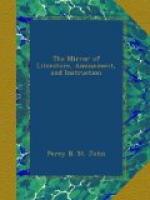The dog is a very different animal. He is really attached to his master, and only lives to serve him. A dog is a perfect gentleman, and I love to fight with gentlemen.
The Apostle Paul, in his Epistle to the Philippians, says,—“Beware of dogs!” c. iii. v. 2. Now, I cannot help always having thought, that he must have meant cats. It is very easy to suppose the Greek word “[Greek: kunas],” may have crept in instead of “[Greek: galas]” and this, indeed, is I believe, corroborated by the folio manuscript copy of the Bible, of 1223, in the British Museum.
Our race is generally said to have come from some of the islands in the Levant, or according to others, from Sweden; but I can ascertain with certainty, that my family came to France along with the Huns, and that my immediate ancestors came over to England with William the Conqueror, in 1066. I consider my blood, therefore, as purely British as any of the inhabitants of the island. There is a tradition among us, that the descendants of the pair who cruised with old Noah, settled in the north of Asia, and that we were to be found no where else for about 500 years afterwards. As to this, however, I do not pretend to speak with certainty; but one thing I know, that wherever man is seen to inhabit, we are to be found—wherever he goes, we attend him. We sent out parties to make discoveries with Vasquez de Gama, Dampier, Anson, and Cook, and although we English gentlemen (who have no blood-relationship with the Norwegians) are known to have such a natural abhorrence at cold, the love of science prevailed, and a strong party were sent to the frozen seas with Ross, Lyon, and Parry. Pontoppidan sagely observes, that “neither the wood nor water R*ts can live farther north than Norway; that there are several districts, as that of Hordenvor, in the diocese of Bergen, and others in the diocese of Aggerhum, where no R*ts are to be found; and that the R*ts on the south banks of the Vormen soon perish, when carried to the north side of it.” But we do not reckon Mr. Pontoppidan a historian implicitly to be believed, and indeed the Admiralty took such care of us, that we might have remained for years at the Pole itself, without even having the toothache!




